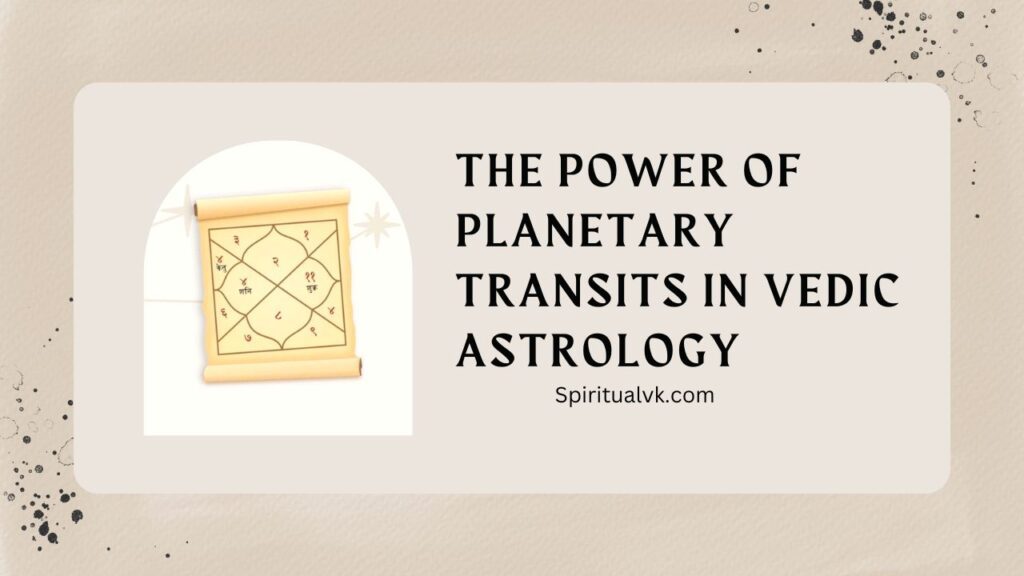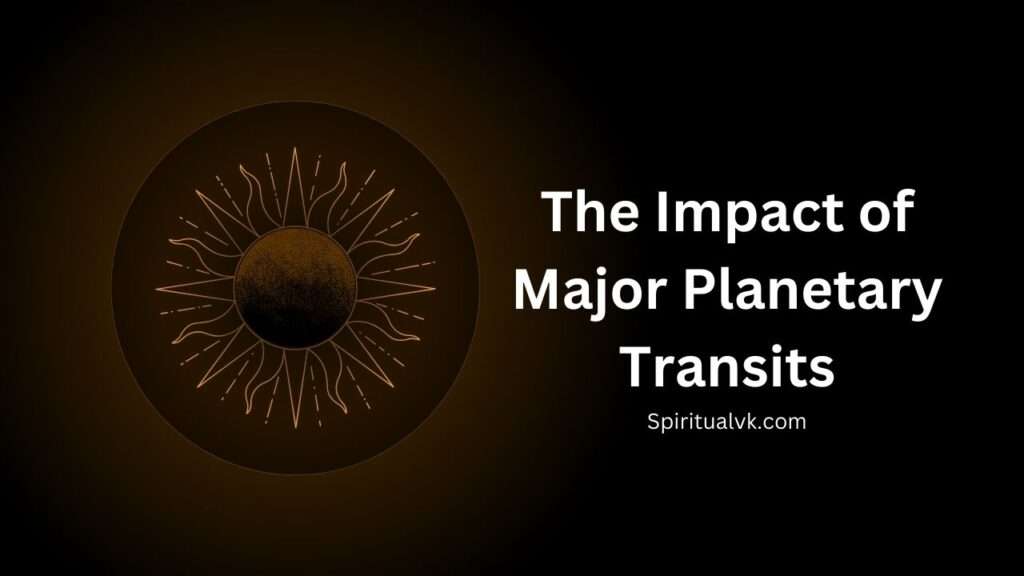Vedic astrology, also known as Jyotish Shastra, is deeply rooted in the belief that celestial bodies influence human life. Among the many astrological concepts, planetary transits (Gochar) are considered one of the most potent forces affecting individual destinies.
A planetary transit occurs when a planet moves from one zodiac sign to another, triggering a variety of effects based on an individual’s birth chart. These transits hold immense power in Vedic astrology, as they can indicate shifts in various aspects of life, including health, career, relationships, and spiritual growth.
Understanding the power of planetary transits helps individuals make informed decisions and prepare for upcoming life changes. This article explores the importance of planetary transits in Vedic astrology, how they work, and their potential effects on different areas of life.

What Are Planetary Transits?
Planetary transits refer to the continuous motion of planets as they move through the twelve zodiac signs. In Vedic astrology, the position of planets at the time of an individual’s birth forms their natal chart (Janma Kundli), which serves as the foundation for predicting future events. The transits of planets relative to the positions in the natal chart are what determine the timing and nature of life events.
Each planet moves at a different speed, and the time it takes to transit from one sign to another varies. For instance:
- The Moon completes a transit of the entire zodiac in about 27 days, spending roughly 2.5 days in each sign.
- The Sun takes about 30 days to move through each sign, completing a full cycle in a year.
- Jupiter, known as the planet of expansion and growth, takes around 12 years to transit through all zodiac signs, remaining in one sign for approximately 12 months.
- Saturn, the planet of discipline and karma, takes about 29.5 years to complete its journey through the zodiac, spending 2.5 years in each sign.
The nature of each planetary transit and the areas of life it affects depend on the planet in question, the zodiac sign it is transiting, and the house it occupies in an individual’s birth chart.

The Impact of Major Planetary Transits
Planetary transits can trigger both favorable and challenging periods in life. Some transits are slow-moving and have long-lasting effects, while others are quick and cause temporary shifts. Here’s how major planetary transits play a role in shaping life events:
1. Sun Transit: The Power of Self
The Sun represents authority, vitality, and the ego. Its transit through different zodiac signs impacts an individual’s sense of self, health, and leadership qualities. Since the Sun moves through one sign each month, its effects are short-lived but significant. A favorable Sun transit can boost self-confidence and bring success in leadership roles, while a challenging transit may lead to health issues or ego conflicts.
For example, a Sun transit through the tenth house (related to career and public image) can bring recognition and career advancements. However, if the Sun is weak or afflicted, it could indicate issues with authority figures or a temporary dip in public reputation.
2. Moon Transit: Emotional Well-being
The Moon governs emotions, mind, and mental health. As it transits through the zodiac signs every 2.5 days, its impact is frequent but subtle. A favorable Moon transit can enhance emotional stability, creativity, and intuition, while a difficult transit may lead to mood swings, anxiety, or emotional disturbances.
For instance, when the Moon transits the fourth house (home and family), individuals may feel more connected to their family and experience a sense of inner peace. On the flip side, a challenging Moon transit through the eighth house may bring hidden fears or emotional turmoil to the surface.
3. Mars Transit: Action and Aggression
Mars represents energy, action, and courage. Its transit brings significant changes in an individual’s ability to take action and assert themselves. Mars takes about 45 days to transit through each sign. A favorable Mars transit brings increased energy, motivation, and success in competitive fields, while an unfavorable one can lead to aggression, conflicts, or impulsive behavior.
For example, during a Mars transit through the first house (self and personality), individuals may feel highly energetic and driven, but they must be cautious of acting too impulsively or aggressively. In the seventh house (relationships), Mars transit can bring passion and assertiveness but may also lead to conflicts in personal partnerships.
4. Jupiter Transit: Expansion and Growth
Jupiter is known as the most benevolent planet, representing wisdom, knowledge, and growth. Its transit, lasting approximately 12 months per sign, is often associated with prosperity, spiritual growth, and opportunities. A positive Jupiter transit can open doors to success, education, and financial growth, while a negative transit may bring overindulgence or missed opportunities.
For example, when Jupiter transits the second house (wealth and speech), individuals may experience financial gains or improvement in their communication skills. However, a Jupiter transit through the twelfth house could lead to excessive spending or spiritual introspection.
5. Saturn Transit: Discipline and Karma
Saturn is a slow-moving planet known for its karmic influence, discipline, and life lessons. It spends about 2.5 years in each sign, making its transits long and impactful. Saturn’s transits are often feared, but they also bring the opportunity for growth through hard work, patience, and resilience. A favorable Saturn transit rewards persistence, while a challenging one can bring delays, hardships, or the need for personal responsibility.
One of the most significant Saturn transits is Sade Sati, a period of seven and a half years when Saturn transits the twelfth, first, and second houses from the natal Moon. This period is believed to bring challenges, but also growth and transformation if navigated with patience and perseverance.
6. Rahu and Ketu Transit: Karmic Nodes
Rahu and Ketu are shadow planets representing karmic patterns and past life influences. They move in retrograde motion and take about 18 months to transit through each zodiac sign. Rahu’s transit is linked to worldly desires, innovation, and material success, while Ketu is associated with spirituality, detachment, and introspection.
A Rahu transit through the tenth house can bring sudden career growth or shifts, while Ketu’s transit through the fourth house may lead to a sense of detachment from material comforts and a focus on inner peace.
How Planetary Transits Affect Different Areas of Life
Planetary transits can influence various areas of life, depending on which houses they impact in the birth chart. Here’s how different areas of life may be affected:
- Career and Finance: Transits of the Sun, Mars, Jupiter, and Saturn often have the most significant impact on career and financial matters. A favorable transit in the tenth house (career) can bring promotions, recognition, and growth, while a challenging transit may lead to obstacles, delays, or changes in professional life.
- Relationships and Marriage: Venus, Mars, and the Moon play key roles in relationships. A Venus transit through the seventh house (partnerships) can bring love, harmony, and marriage opportunities, while a Mars transit may create tensions or conflicts in relationships.
- Health and Well-being: The transits of the Sun, Moon, and Saturn are closely tied to health and vitality. For example, a Sun transit through the sixth house (health) can enhance physical strength, while a challenging Saturn transit through the same house may bring chronic health issues.
- Spirituality and Personal Growth: Transits of Jupiter, Ketu, and Saturn are often associated with spiritual growth and personal transformation. A Jupiter transit through the ninth house (spirituality) can deepen one’s faith and interest in higher knowledge, while a Ketu transit in the twelfth house may lead to a period of deep introspection and detachment from worldly desires.
The Importance of Timing in Vedic Astrology
In Vedic astrology, the timing of planetary transits is crucial for predicting events and understanding life patterns. The Dasha system, which divides life into different planetary periods, works in conjunction with planetary transits to provide more detailed and personalized predictions. While a favorable transit may bring opportunities, the Dasha system helps astrologers determine the exact timing of those opportunities based on an individual’s karmic cycles.
Conclusion
Planetary transits hold immense power in Vedic astrology, influencing various aspects of life, including career, relationships, health, and spirituality. By understanding the movement of planets and their effects, individuals can prepare for life’s challenges and make the most of favorable periods. Whether it’s the karmic lessons of Saturn or the expansive energy of Jupiter, planetary transits serve as a guiding force, helping individuals align with their higher purpose and navigate the complexities of life with greater awareness.
In essence, the power of planetary transits lies in their ability to provide insights into the timing and nature of life events, offering individuals a deeper understanding of their journey and the tools to navigate it with wisdom.


